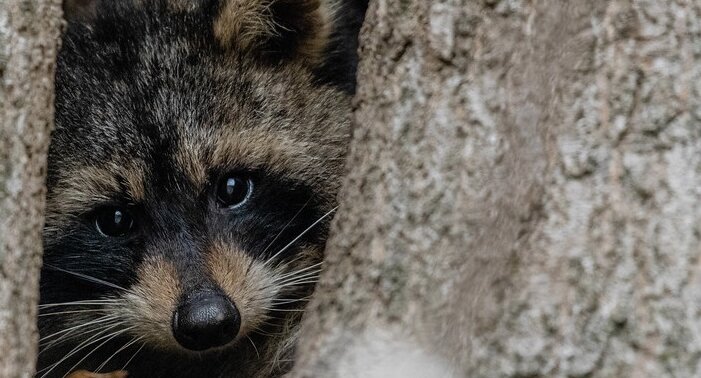
“Who me?” said the raccoon
Learn about one of China Camp’s cleverest—and naughtiest—critters
Have you ever spent the night at a campsite, then woken up the next morning to discover that somebody got to your breakfast before you did? You may have had a late-night visit from a masked marauder—a wild raccoon. This time of year, our Back Ranch Meadows Campground is packed with happy campers, especially on weekends. The campground also attracts these uninvited visitors, sporting black masks and banded tails. It’s not unusual to see these clever and resourceful omnivores (they eat almost anything) slipping out of the shadows come evening, poking around the campground in search of an easy meal.
The campground isn’t the only place at China Camp that’s popular with raccoons. These nocturnal critters have been found hiding out in other unexpected locations in the park, including under the Ranger Station and in storage closets at China Camp Village. For the past couple of years, a female raccoon has raised a litter of kits (aka raccoon babies) in a space below the roof shingles topping our historic cafe. (Efforts to fix the damage caused by this mama raccoon, and reducing her chances of returning, are now underway.)
From deep forests to city streets
All this raccoon-y activity is par for the course for these clever mammals. From the dense forests of southern Canada, to farms and ranchlands in our heartlands, to the mean streets of American cities, raccoons have settled into a dizzying variety of settings and ecosystems.
Originally found in wet, densely forested areas filled with their natural foods—things like frogs, fish, wild fruits, bird eggs, and even banana slugs—these opportunistic foragers have found easy pickings when it came to humans. Now, these creatures of the night have moved into urban areas, where things like overflowing garbage cans, porches with dishes of cat food, and trash containers have became popular sources for food. Storm drains and culverts provide easy, hidden passageways. Raccoons have found a way not just to live with humans, but to thrive with them.
Raccoons are native to our area, and are protected and valued as important members of our wildlife community in the park. But we don’t want to put them (or ourselves) at risk by tempting them with easy access to human or pet food. Nor do we want to lure them close for Instagram snaps. Instead, we need to heed this list of smart tips to keep raccoons, and other wildlife that could be tempted to grab a snack or move in where it’s not wanted, safe and healthy.
Instead, we should all try to follow these steps when camping, picnicking, or just having a snack out on the trails.
- Store all food in lockable coolers and in the wooden food lockers provided at each campsite. You can also store food in your car.
- Never leave food out on picnic tables or in tents. (Sorry, no bedtime snacks under your pillow.)
- Thoroughly wash all cookware and utensils. If your barbecue grill has tasty bits of food, aim to clean them off.
- Dispose of all food waste and packaging in receptacles installed throughout the campground. Be sure to secure all lids.
- If you brought a pet to the campground, make sure it is on a six-foot fixed leash at all times. Do not leave out food. Raccoons are known to attack dogs in defense, and bites can be very dangerous, even lethal.
- Never approach a raccoon, especially with food. Raccoons can be extremely aggressive (think sharp teeth and claws and no problem using them). They may also transmit dangerous diseases to humans. Don’t tempt fate for the sake of a cute photo.
- If you find a raccoon in an unexpected place in our campground or elsewhere in the park, or if you feel threatened in any way by raccoons or other wildlife, quietly back away. Contact the campground host immediately, or call the Ranger Station at (415) 456-0766.
—Harriot Manley/FOCC volunteer

